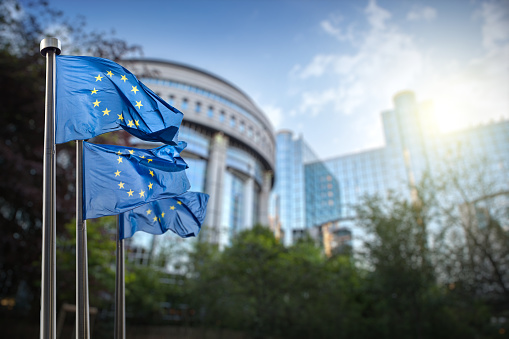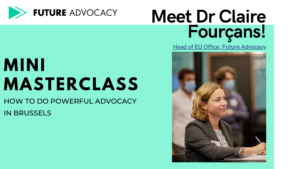
By Claire Fourçans
Would you like to influence the EU institutions for positive social change but don’t know where to start? Advocacy and campaigns at the EU level have their own specificities so we have a few tips for you to get started. We will try to help you understand how the EU works, who you need to reach out to and how to make progress. Let’s dive into what it takes to do successful advocacy towards the EU institutions.
How does the EU work?
The EU is a complex environment, with 3 institutions, limited competences and a set of varied actors. Without getting into the details of EU law and procedure, you must know that the European Commission is the body proposing legislation, that the European Parliament is the only directly elected EU institution with co-decision power on most EU laws, and that the European Council (not to be confused with the Council of Europe) is the coming together of the 27 EU Member States. The European Council is a co-legislator and takes decisions either unanimously or at a majority.
The EU today is the result of decades of progress towards more and more political integration, with strong powers on economic and financial issues but much more limited competencies in other areas. It is therefore important to know if and how the EU can help you get the change you want to see. You must check out the EU Treaties and the practice of the European Commission in your area of work to see what is a realistic ask to the EU.
Beyond the theory, there is of course all the soft skills and network which is essential to advance your advocacy and campaign.
Embed yourself in the “EU bubble”
The EU is made of 27 Member States and covers a very large geographical area, but the centre of the EU power is very restricted to a few streets and buildings in Brussels’ EU quarter. And what is called the “EU bubble” (ie the people working in Brussels with or around the EU institutions) must become your environment.
To integrate in the bubble, it is better if you have a good level of English but speak many languages. If you do, it will help you mingle with diverse crowds, make connections with a larger group of people and create this network which is so important in Brussels. It is natural that expats will tend to create closer relationships with their fellow nationals or with those having ties with their country of origin.
But there’s not only the English language which you must master to be a true “EU bubble” participant. You must be aware that “Plux” is the Place du Luxembourg in front of the European Parliament, that “trilogues” is the informal (and not foreseen by the Treaties) negotiating space for the 3 institutions, that a “Gymnich” meeting is the informal reunion of EU Foreign Affairs Ministers, etc. In brief, it’s good to speak “EU language”.
Identify who can bring change to your issue
Once you know what is a realistic ask for the EU and you are familiar with the lingo, you must understand who can help you bring progress. The European Commission would be your natural target if you want to see legislative changes. Have a look at the European Commission work programme for the year or the following year to know if there would be a vehicle for your change. You must then look for the Directorate General competent in your area and identify who would be the relevant civil servants on your policy – for this check the EU Whoiswho. However, if the Commission has already proposed a legislative framework in your area, you must focus your attention at the European Parliament and the Council.
Under the ordinary legislative procedure, the European Parliament (EP) and the Council take decisions together (“co-decision” procedure). For each of the files under this procedure, the European Parliament will designate which Committee(s) is in charge. Committee(s) will then decide which MEPs will be rapporteurs and co-rapporteurs. Those (co-)rapporteurs are each representatives of a different political group in the EP. That is the beginning of intense discussions between rapporteurs and within Committees and political groups, up until an agreement is reached. This agreement is the basis from which the European Parliament will negotiate with Member States.
In parallel and ahead of the negotiating period, the Council also works on reaching a joint position. Discussions are led by the country holding the Presidency of the European Council. This Presidency rotates every 6 months. It is important that you identify which EU country will be holding the Presidency ahead and during negotiations with the EP. You could try to influence the list of priorities for their presidency, through outreach to the government in the country’s capital but also through direct contact with its Permanent Representation to the EU in Brussels. And you should keep close ties at both levels when the file is under negotiations.
Now that you have mapped your stakeholders and identified your ask, you can start the advocacy and campaign.
Sharpen your arguments with key players
You need to have a strong policy background to justify why change is needed and how the EU institutions can help. Your ask will need to be tested and adjusted according to your meetings with decision-makers. They will be able to tell you where support is needed, what are tension points and how you can help. It is key to know what you can give in the relationships with stakeholders which should be seen as much as possible as a partnership.
It’s key to know who can be allies, opponents and what are areas for compromise. You can help build alliances and share information with stakeholders who otherwise might not have access. This aspect is crucial in Brussels where you virtually have to convince more than 700 MEPs and 27 EU Member States. This is also why it is important to know which other groups you could partner with in your advocacy.
Once you have started this interaction, it is all about continuously building the relationship and being present to push your demands throughout the lengthy EU procedure. Be patient and persistent as this can take years but keep your eyes on the prize: eventually, your change will have a positive impact on more than 400 million EU citizens!
To find out more, watch my MiniMasterclass with Future Advocacy CEO Olly Buston
